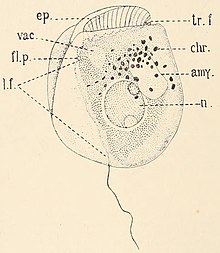| Amphidinium | |
|---|---|

| |
| Lateral view of Amphidinium sulcatum. amy., amyloid body; chr., chromatophore; ep., anterior part of cell in front of transverse furrow; fl.p., flagellar pore; l.f., longitudinal furrow; n., cell nucleus; tr.f., transverse furrow (with flagellum); vac., vacuole. | |
| Scientific classification | |
| Domain: | Eukaryota |
| Clade: | Diaphoretickes |
| Clade: | SAR |
| Clade: | Alveolata |
| Phylum: | Myzozoa |
| Superclass: | Dinoflagellata |
| Class: | Dinophyceae |
| Order: | Gymnodiniales |
| Family: | Gymnodiniaceae |
| Genus: | Amphidinium Clap. & J.Lachm. 1859 |
Amphidinium is a genus of dinoflagellates. The type for the genus is Amphidinium operculatum Claparède & Lachmann. The genus includes the species Amphidinium carterae which is used as a model organism.[1]
As dinoflagellates, Amphidinium spp. have chloroplasts. The Amphidinium chloroplast genome is unusual in not having a single contiguous circular genome.[2][3] Instead, chloroplast genes encoded in chloroplast DNA are found on numerous 2-3 kbp minicircles,[2][3] analogous to plasmids. Most minicircles have only a few protein-coding genes; many have just a single gene.[2][3] There are reports of minicircles that do not have known transcripts, like in the Amphidinium carterae chloroplast genome,[3] although these were not found in the Symbiodinium sp. Clade C3 chloroplast genome.[2] Minicircle-derived transcripts can be processed in ways not typical of eukaryotes, including the addition of a 3' poly(U) tail,[3] as opposed to the typical poly(A) tail derived from polyadenylation of eukaryotic transcripts. Minicircle-derived antisense transcripts are also produced, but without 3' poly(U) tails.[3]
- ^ Nash, E.; Barbrook, A.; Edwards-Stuart, R.; Bernhardt, K.; Howe, C.; Nisbet, R. (2007). "Organization of the mitochondrial genome in the dinoflagellate Amphidinium carterae". Molecular Biology and Evolution. 24 (7): 1528–1536. doi:10.1093/molbev/msm074. PMID 17440175.
- ^ a b c d Barbrook, Adrian C.; Voolstra, Christian R.; Howe, Christopher J. (2014). "The Chloroplast Genome of a Symbiodinium sp. Clade C3 Isolate". Protist. 165 (1): 1–13. doi:10.1016/j.protis.2013.09.006. hdl:10754/563301. PMID 24316380.
- ^ a b c d e f Dorrell, Richard G.; Nisbet, R. Ellen R.; Barbrook, Adrian C.; Rowden, Stephen J.L.; Howe, Christopher J. (2019). "Integrated Genomic and Transcriptomic Analysis of the Peridinin Dinoflagellate Amphidinium carterae Plastid". Protist. 170 (4): 358–373. doi:10.1016/j.protis.2019.06.001. PMID 31415953. S2CID 198240765.